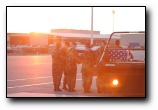By The Dawn’s Early Light?
The funeral in Rome last month for Nicola Calipari – the Italian intelligence officer who rescued a kidnapped journalist from Iraqi captors, only to be gunned down by jittery American soldiers at a checkpoint in Baghdad – was a national event that united all Italians, merging their raw sorrow with the singular grief of his widow and children. It was the second time Italy pulled out all the stops for its Iraq War dead. In November of 2003, it staged an elaborate state funeral for nineteen of its citizens, killed in a suicide truck bombing in Nasiriyah.
Both times, Italy’s Prime Minister Silvio Berlusconi, his ministers, President Carlo Ciampi, and an honor guard stood with grieving families on the tarmac of Rome’s Ciampino military airport to receive their dead. There were national days of mourning and public visitation hours, and at night, the Coliseum’s lights were dimmed in a mark of respect.
All Italy watched (on television) as officers from Italy’s civil services carried the flag-draped coffins past honor guards representing every branch of the military. The Honor Guard stood guard while lone buglers played the Last Post and other laments. Stricken Italians lined the routes of the funeral cortege to pay their respects, before the bodies were entombed in Rome’s war memorial.
This public participation in these last rites is the symbol of a shared sacrifice between those who prosecute wars, those who must fight them, and those who grieve and honor them—not just the dead and their families, but the entire nation.
America, on the other hand, with 1,516 U.S. fatalities in Iraq as of March 16, 2005, pays little public attention to its war dead. Indeed, aside from the printed obituaries in metro sections of dailies, there is little acknowledgment by the government or substantial reporting in the media of the soldiers who perish in Iraq and the families they leave behind. We do not see or hear them. They die alone on the hot sands of Iraq and their survivors grieve privately on American soil.
 This administration, which asks for courage and resolve from the military, can find in itself neither courage nor resolve to embrace them in death. According to Pentagon rules, “There will be no arrival ceremonies for, or media coverage of, deceased military personnel returning to or departing from Ramstein [Germany] airbase or Dover [Del.] base, to include interim stops.” Last year, defense contractor Maytag Aircraft fired civilian workers, Tami Silicio and David Landry, for taking photographs of soldiers’ coffins at an airbase in Kuwait. The photographs surfaced at www.memoryhole.com after a Freedom of Information Act request.
This administration, which asks for courage and resolve from the military, can find in itself neither courage nor resolve to embrace them in death. According to Pentagon rules, “There will be no arrival ceremonies for, or media coverage of, deceased military personnel returning to or departing from Ramstein [Germany] airbase or Dover [Del.] base, to include interim stops.” Last year, defense contractor Maytag Aircraft fired civilian workers, Tami Silicio and David Landry, for taking photographs of soldiers’ coffins at an airbase in Kuwait. The photographs surfaced at www.memoryhole.com after a Freedom of Information Act request.
Even acknowledging soldiers’ deaths through meaningful tributes upsets many in the war faction. When Nightline anchor, Ted Koppel, broadcast a tribute to the soldiers who had died in Iraq by reading their names off camera while the photographs of the dead men and women were projected on the screen, supporters of the war cried foul.
The President has also made it his policy not to attend military funerals. If he believes our military is fighting for noble ideals, if he admires, as he says, their valor and sacrifice, why must he absent himself from their funerals or prevent our witness of their final return? Why must our war dead come home like thieves in the night?
In July of 1965, at the height of the Vietnam War, President Lyndon Johnson spoke with a previously elusive candor. “I do not find it easy to send the flower of our youth, our finest young men, into battle. I have seen them filled with hope and life. I think that I know, too, how their mothers weep and how their families sorrow.”
But president Bush doesn’t know and neither do we. His war machine brings our fallen soldiers home from Iraq, dead as dead can be, and drops them down the well of forgotten.
Do you hear the thud? Can you bear it?

